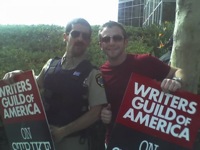
I’m interviewed in the new book Tales from the Script, which talks to a bunch of screenwriters about their experience working in the industry.
I just got a review copy, and I’ll confess that the only thing I’ve done so far is flip through to make sure my quotes are reasonably coherent. And they are — so kudos to the copy editor. As I turned pages, I noticed many things I want to go back and read, including bits by the always-entertaining Josh Friedman and Shane Black. The book also features Frank Darabont, Nora Ephron, Paul Schrader, David Hayter and more than 40 others.
The book is blurby and conversational, like listening to a film festival panel in which the microphone gets handed around a lot. That’s not a criticism, but an attempt to frame expectations. I think a lot of readers will like it, but it’s not a master class or anything.
The book is available in paperback
and [Kindle](http://www.amazon.com/Tales-from-the-Script-ebook/dp/B00338QETC/ref=tmm_kin_title_0?ie=UTF8&m=AG56TWVU5XWC2) editions. There’s also a companion DVD
coming, if you really want to see the giant world map from my old office.
 You cannot forget that word “assistant” in your title. Though you have access to every aspect of your boss’ life, you’re not an executive. Your thoughts, your feelings, and your opinions aren’t particularly important. Maybe one day your boss and you will forge some professional relationship and you’ll become more than an assistant. Until then, be quiet, listen, and make sure your boss looks good.
You cannot forget that word “assistant” in your title. Though you have access to every aspect of your boss’ life, you’re not an executive. Your thoughts, your feelings, and your opinions aren’t particularly important. Maybe one day your boss and you will forge some professional relationship and you’ll become more than an assistant. Until then, be quiet, listen, and make sure your boss looks good. A few years back, a young woman, brand new to Hollywood, somehow landed an assistant position at a major agency. At the end of her first week, she sent her hometown friends a breathlessly gushy e-mail about all the important people she’s met, and the juicy conversations she’s overheard. Unfortunately, she accidentally sent the e-mail to her the entire agency. She was fired on the spot.
A few years back, a young woman, brand new to Hollywood, somehow landed an assistant position at a major agency. At the end of her first week, she sent her hometown friends a breathlessly gushy e-mail about all the important people she’s met, and the juicy conversations she’s overheard. Unfortunately, she accidentally sent the e-mail to her the entire agency. She was fired on the spot. On Day One in Los Angeles, I picked up a copy of the LA Weekly. I saw mention of a little thing called the “Writers’ Strike.” And I thought, great. Of all the ill-timed ventures, I just made my big L.A. move two weeks before every writing job in the city was about to disappear. Nice move, Schwartz. Real nice.
On Day One in Los Angeles, I picked up a copy of the LA Weekly. I saw mention of a little thing called the “Writers’ Strike.” And I thought, great. Of all the ill-timed ventures, I just made my big L.A. move two weeks before every writing job in the city was about to disappear. Nice move, Schwartz. Real nice.